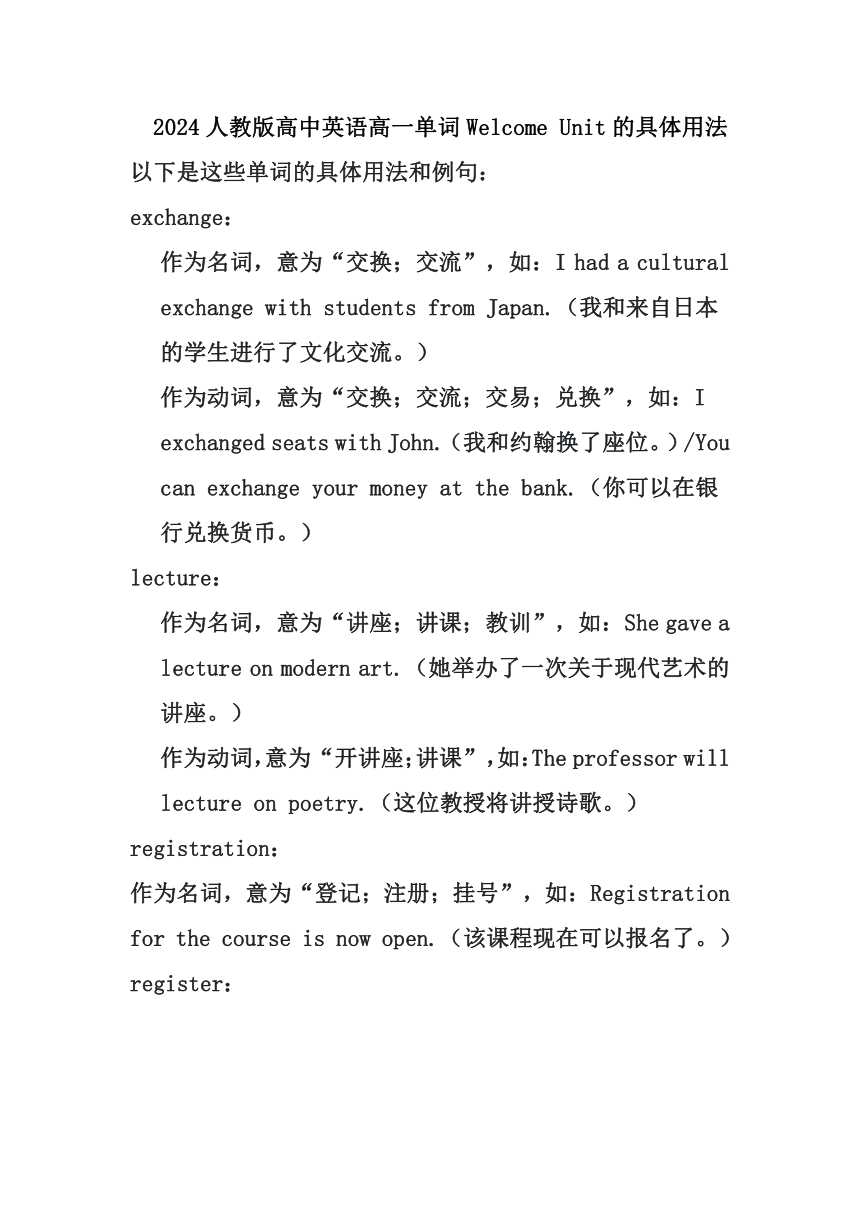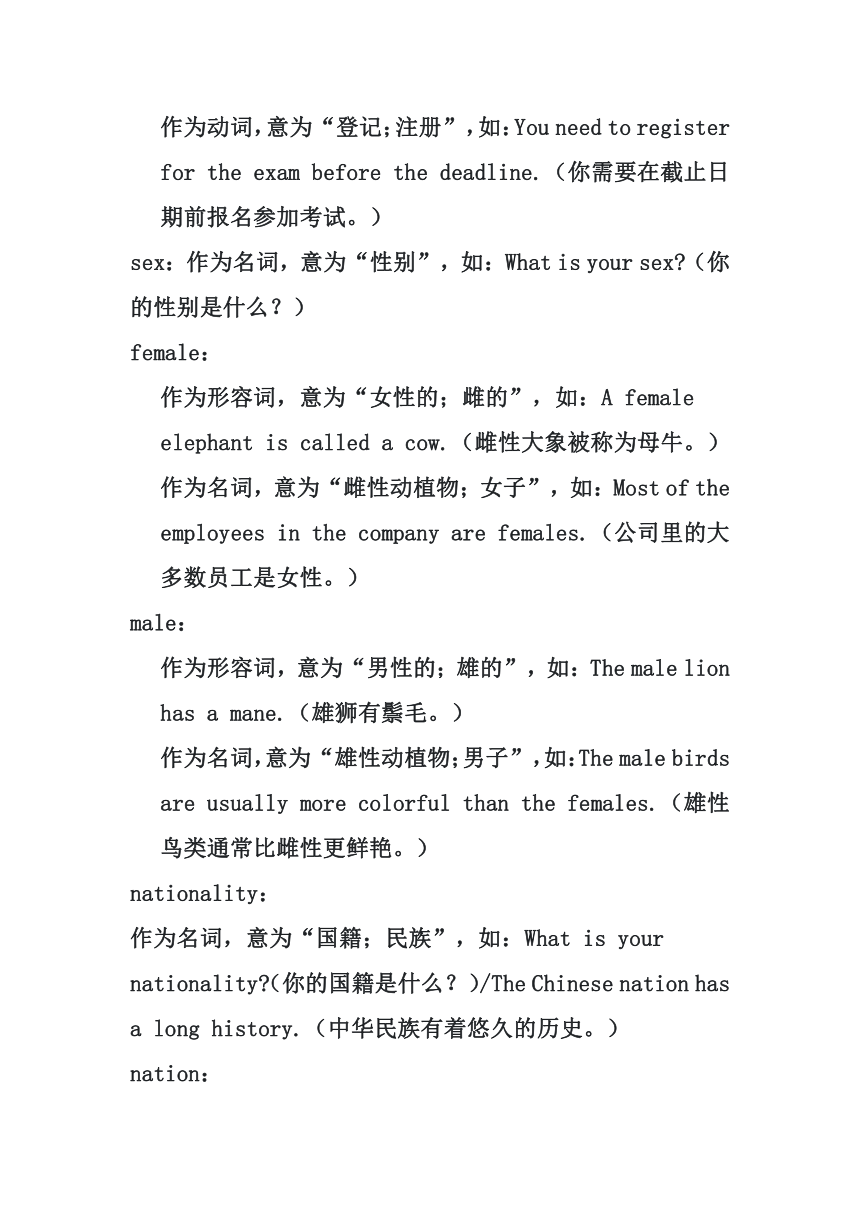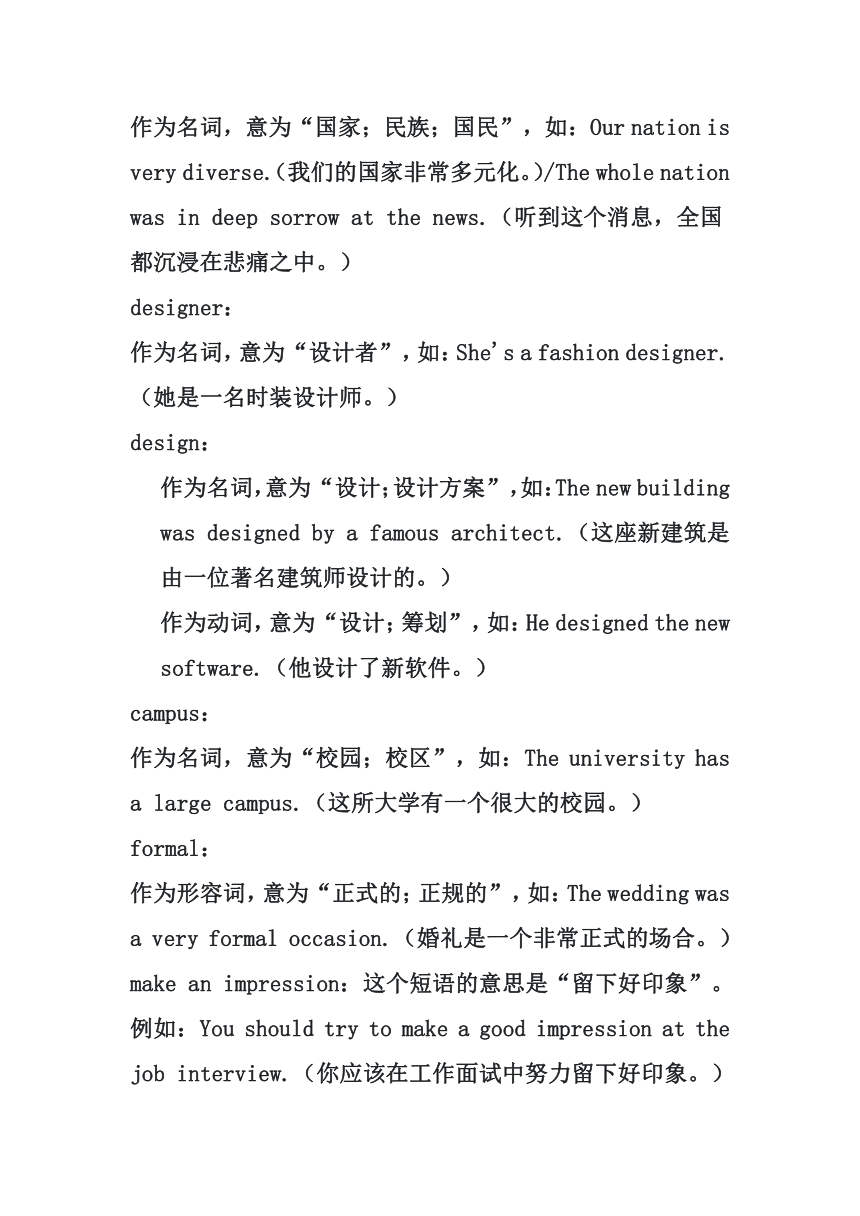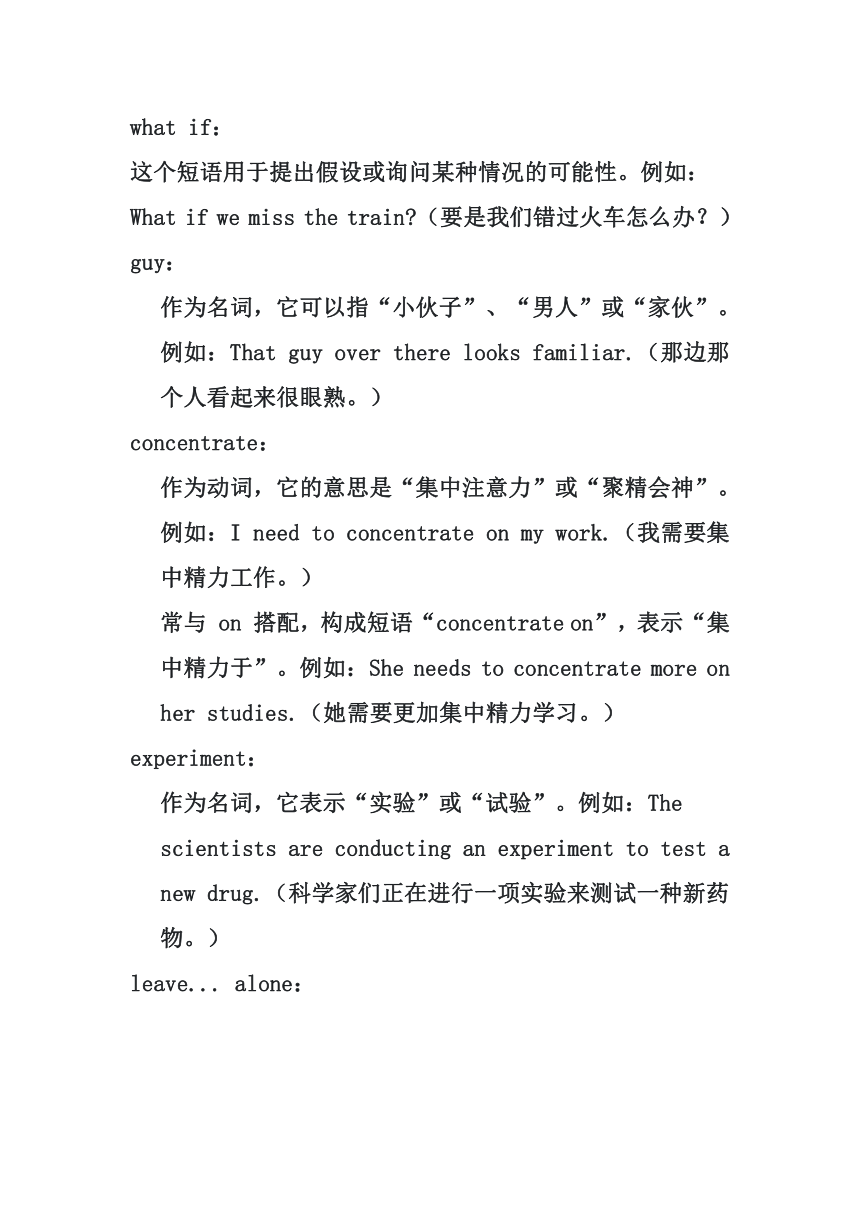人教版(2019)必修 第一册Welcome unit单词讲义
文档属性
| 名称 | 人教版(2019)必修 第一册Welcome unit单词讲义 |

|
|
| 格式 | docx | ||
| 文件大小 | 21.0KB | ||
| 资源类型 | 教案 | ||
| 版本资源 | 人教版(2019) | ||
| 科目 | 英语 | ||
| 更新时间 | 2024-02-16 10:26:59 | ||
图片预览




文档简介
2024人教版高中英语高一单词Welcome Unit的具体用法
以下是这些单词的具体用法和例句:
exchange:
作为名词,意为“交换;交流”,如:I had a cultural exchange with students from Japan.(我和来自日本的学生进行了文化交流。)
作为动词,意为“交换;交流;交易;兑换”,如:I exchanged seats with John.(我和约翰换了座位。)/You can exchange your money at the bank.(你可以在银行兑换货币。)
lecture:
作为名词,意为“讲座;讲课;教训”,如:She gave a lecture on modern art.(她举办了一次关于现代艺术的讲座。)
作为动词,意为“开讲座;讲课”,如:The professor will lecture on poetry.(这位教授将讲授诗歌。)
registration:
作为名词,意为“登记;注册;挂号”,如:Registration for the course is now open.(该课程现在可以报名了。)
register:
作为动词,意为“登记;注册”,如:You need to register for the exam before the deadline.(你需要在截止日期前报名参加考试。)
sex:作为名词,意为“性别”,如:What is your sex (你的性别是什么?)
female:
作为形容词,意为“女性的;雌的”,如:A female elephant is called a cow.(雌性大象被称为母牛。)
作为名词,意为“雌性动植物;女子”,如:Most of the employees in the company are females.(公司里的大多数员工是女性。)
male:
作为形容词,意为“男性的;雄的”,如:The male lion has a mane.(雄狮有鬃毛。)
作为名词,意为“雄性动植物;男子”,如:The male birds are usually more colorful than the females.(雄性鸟类通常比雌性更鲜艳。)
nationality:
作为名词,意为“国籍;民族”,如:What is your nationality (你的国籍是什么?)/The Chinese nation has a long history.(中华民族有着悠久的历史。)
nation:
作为名词,意为“国家;民族;国民”,如:Our nation is very diverse.(我们的国家非常多元化。)/The whole nation was in deep sorrow at the news.(听到这个消息,全国都沉浸在悲痛之中。)
designer:
作为名词,意为“设计者”,如:She's a fashion designer.(她是一名时装设计师。)
design:
作为名词,意为“设计;设计方案”,如:The new building was designed by a famous architect.(这座新建筑是由一位著名建筑师设计的。)
作为动词,意为“设计;筹划”,如:He designed the new software.(他设计了新软件。)
campus:
作为名词,意为“校园;校区”,如:The university has a large campus.(这所大学有一个很大的校园。)
formal:
作为形容词,意为“正式的;正规的”,如:The wedding was a very formal occasion.(婚礼是一个非常正式的场合。)
make an impression:这个短语的意思是“留下好印象”。例如:You should try to make a good impression at the job interview.(你应该在工作面试中努力留下好印象。)
what if:
这个短语用于提出假设或询问某种情况的可能性。例如:What if we miss the train (要是我们错过火车怎么办?)
guy:
作为名词,它可以指“小伙子”、“男人”或“家伙”。例如:That guy over there looks familiar.(那边那个人看起来很眼熟。)
concentrate:
作为动词,它的意思是“集中注意力”或“聚精会神”。例如:I need to concentrate on my work.(我需要集中精力工作。)
常与 on 搭配,构成短语“concentrate on”,表示“集中精力于”。例如:She needs to concentrate more on her studies.(她需要更加集中精力学习。)
experiment:
作为名词,它表示“实验”或“试验”。例如:The scientists are conducting an experiment to test a new drug.(科学家们正在进行一项实验来测试一种新药物。)
leave... alone:
这个短语的意思是“不打扰”或“不惊动”。例如:Just leave her alone and she'll calm down.(别去打扰她,她会冷静下来的。)
awkward:
这个形容词用来描述某种情况或人感到“令人尴尬的”或“难对付的”。例如:The situation became very awkward.(情况变得非常尴尬。)
junior:
作为形容词,它表示“地位或职位较低的”。例如:She is a junior member of the team.(她是团队中的初级成员。)
作为名词,它可以指“职位较低者”或“青少年”,如“junior high school”(初中)。
explore:
作为动词,它的意思是“探索”或“探究”。例如:We want to explore new opportunities.(我们想要探索新的机会。)
confident:
这个形容词表示“自信的”或“有把握的”。例如:She is a confident speaker.(她是一个自信的演讲者。)
好的,以下是这些单词的具体用法和例句:
confidence:
作为名词,confidence 表示信心、信任。例如:She has full confidence in herself.(她对自己充满信心。)/You need to build up your confidence.(你需要建立自信。)
forward:
作为副词,forward 表示向前、前进,如:He moved forward slowly.(他慢慢地向前移动。)/The project is moving forward.(项目正在前进。)
作为形容词,forward 表示向前的、前进的,如:The forward thinking company is always looking for new opportunities.(这家具有前瞻性的公司总是在寻找新的机会。)
look forward to:
这个短语的意思是盼望、期待。例如:I'm looking forward to seeing you again.(我期待着再次见到你。)
take notes:
表示记笔记的意思。例如:She takes notes carefully in class.(她在课堂上认真记笔记。)
flash:
作为名词,flash 可以指光、信号,如:A flash of lightning lit up the sky.(一道闪电照亮了天空。)
作为动词,flash 可以表示闪耀、闪光、发出信号等,如:The stars flashed in the dark sky.(星星在黑暗的天空中闪烁。)/He flashed his lights to signal the other driver.(他闪烁车灯向另一位司机发出信号。)
flash card:
指教学卡片、识字卡。例如:The students use flash cards to learn vocabulary.(学生们使用教学卡片学习词汇。)
organise/organisation:
organise 作为动词,意思是组织、筹备、安排、组建等,如:She organised the event very well.(她组织这次活动组织得很好。)
organisation 是名词,指组织、团体、机构,如:The non-profit organisation provides help to the community.(这个非营利组织为社区提供帮助。)
goal:
表示目标、球门或射门。例如:Our goal is to finish the project on time.(我们的目标是按时完成这个项目。)/The football player scored a goal.(这位足球运动员进了一个球。)
strategy:
指策略、策划。例如:Our company needs to develop a new marketing strategy.(我们公司需要制定新的营销策略。)
partner:
作为名词,partner 可以表示同伴、配偶或合伙人。例如:He is my business partner.(他是我的商业伙伴。)/She is looking for a life partner.(她在寻找生活伴侣。)
improve:
既可以作动词也可以作名词,常用于改进、改善的意思。例如:We need to improve our communication skills.(我们需要提高我们的沟通技巧。)/The new system has improved efficiency.(新系统提高了效率。)
company:
作为名词,company 可以表示公司、商行,例如:He works for a large international company.(他在一家大型国际公司工作。)
也可以表示伴、陪伴,例如:I enjoy the company of my friends.(我喜欢朋友的陪伴。)
personality:
指性格、个性,例如:She has a strong personality.(她有很强的个性。)
还可以表示名人,例如:He is a famous personality.(他是一位知名人士。)
style:
表示方式、作风,例如:She has a unique style of dressing.(她有独特的着装风格。)
也可以指款式、类型,例如:This style of furniture is very popular.(这种款式的家具很受欢迎。)
revise:
作为动词,revise 意为修改、修订,例如:Please revise your essay before submitting it.(请在提交之前修改你的论文。)
也有复习的意思,例如:I need to revise for the exam.(我需要复习准备考试。)
以下是这些单词的具体用法和例句:
exchange:
作为名词,意为“交换;交流”,如:I had a cultural exchange with students from Japan.(我和来自日本的学生进行了文化交流。)
作为动词,意为“交换;交流;交易;兑换”,如:I exchanged seats with John.(我和约翰换了座位。)/You can exchange your money at the bank.(你可以在银行兑换货币。)
lecture:
作为名词,意为“讲座;讲课;教训”,如:She gave a lecture on modern art.(她举办了一次关于现代艺术的讲座。)
作为动词,意为“开讲座;讲课”,如:The professor will lecture on poetry.(这位教授将讲授诗歌。)
registration:
作为名词,意为“登记;注册;挂号”,如:Registration for the course is now open.(该课程现在可以报名了。)
register:
作为动词,意为“登记;注册”,如:You need to register for the exam before the deadline.(你需要在截止日期前报名参加考试。)
sex:作为名词,意为“性别”,如:What is your sex (你的性别是什么?)
female:
作为形容词,意为“女性的;雌的”,如:A female elephant is called a cow.(雌性大象被称为母牛。)
作为名词,意为“雌性动植物;女子”,如:Most of the employees in the company are females.(公司里的大多数员工是女性。)
male:
作为形容词,意为“男性的;雄的”,如:The male lion has a mane.(雄狮有鬃毛。)
作为名词,意为“雄性动植物;男子”,如:The male birds are usually more colorful than the females.(雄性鸟类通常比雌性更鲜艳。)
nationality:
作为名词,意为“国籍;民族”,如:What is your nationality (你的国籍是什么?)/The Chinese nation has a long history.(中华民族有着悠久的历史。)
nation:
作为名词,意为“国家;民族;国民”,如:Our nation is very diverse.(我们的国家非常多元化。)/The whole nation was in deep sorrow at the news.(听到这个消息,全国都沉浸在悲痛之中。)
designer:
作为名词,意为“设计者”,如:She's a fashion designer.(她是一名时装设计师。)
design:
作为名词,意为“设计;设计方案”,如:The new building was designed by a famous architect.(这座新建筑是由一位著名建筑师设计的。)
作为动词,意为“设计;筹划”,如:He designed the new software.(他设计了新软件。)
campus:
作为名词,意为“校园;校区”,如:The university has a large campus.(这所大学有一个很大的校园。)
formal:
作为形容词,意为“正式的;正规的”,如:The wedding was a very formal occasion.(婚礼是一个非常正式的场合。)
make an impression:这个短语的意思是“留下好印象”。例如:You should try to make a good impression at the job interview.(你应该在工作面试中努力留下好印象。)
what if:
这个短语用于提出假设或询问某种情况的可能性。例如:What if we miss the train (要是我们错过火车怎么办?)
guy:
作为名词,它可以指“小伙子”、“男人”或“家伙”。例如:That guy over there looks familiar.(那边那个人看起来很眼熟。)
concentrate:
作为动词,它的意思是“集中注意力”或“聚精会神”。例如:I need to concentrate on my work.(我需要集中精力工作。)
常与 on 搭配,构成短语“concentrate on”,表示“集中精力于”。例如:She needs to concentrate more on her studies.(她需要更加集中精力学习。)
experiment:
作为名词,它表示“实验”或“试验”。例如:The scientists are conducting an experiment to test a new drug.(科学家们正在进行一项实验来测试一种新药物。)
leave... alone:
这个短语的意思是“不打扰”或“不惊动”。例如:Just leave her alone and she'll calm down.(别去打扰她,她会冷静下来的。)
awkward:
这个形容词用来描述某种情况或人感到“令人尴尬的”或“难对付的”。例如:The situation became very awkward.(情况变得非常尴尬。)
junior:
作为形容词,它表示“地位或职位较低的”。例如:She is a junior member of the team.(她是团队中的初级成员。)
作为名词,它可以指“职位较低者”或“青少年”,如“junior high school”(初中)。
explore:
作为动词,它的意思是“探索”或“探究”。例如:We want to explore new opportunities.(我们想要探索新的机会。)
confident:
这个形容词表示“自信的”或“有把握的”。例如:She is a confident speaker.(她是一个自信的演讲者。)
好的,以下是这些单词的具体用法和例句:
confidence:
作为名词,confidence 表示信心、信任。例如:She has full confidence in herself.(她对自己充满信心。)/You need to build up your confidence.(你需要建立自信。)
forward:
作为副词,forward 表示向前、前进,如:He moved forward slowly.(他慢慢地向前移动。)/The project is moving forward.(项目正在前进。)
作为形容词,forward 表示向前的、前进的,如:The forward thinking company is always looking for new opportunities.(这家具有前瞻性的公司总是在寻找新的机会。)
look forward to:
这个短语的意思是盼望、期待。例如:I'm looking forward to seeing you again.(我期待着再次见到你。)
take notes:
表示记笔记的意思。例如:She takes notes carefully in class.(她在课堂上认真记笔记。)
flash:
作为名词,flash 可以指光、信号,如:A flash of lightning lit up the sky.(一道闪电照亮了天空。)
作为动词,flash 可以表示闪耀、闪光、发出信号等,如:The stars flashed in the dark sky.(星星在黑暗的天空中闪烁。)/He flashed his lights to signal the other driver.(他闪烁车灯向另一位司机发出信号。)
flash card:
指教学卡片、识字卡。例如:The students use flash cards to learn vocabulary.(学生们使用教学卡片学习词汇。)
organise/organisation:
organise 作为动词,意思是组织、筹备、安排、组建等,如:She organised the event very well.(她组织这次活动组织得很好。)
organisation 是名词,指组织、团体、机构,如:The non-profit organisation provides help to the community.(这个非营利组织为社区提供帮助。)
goal:
表示目标、球门或射门。例如:Our goal is to finish the project on time.(我们的目标是按时完成这个项目。)/The football player scored a goal.(这位足球运动员进了一个球。)
strategy:
指策略、策划。例如:Our company needs to develop a new marketing strategy.(我们公司需要制定新的营销策略。)
partner:
作为名词,partner 可以表示同伴、配偶或合伙人。例如:He is my business partner.(他是我的商业伙伴。)/She is looking for a life partner.(她在寻找生活伴侣。)
improve:
既可以作动词也可以作名词,常用于改进、改善的意思。例如:We need to improve our communication skills.(我们需要提高我们的沟通技巧。)/The new system has improved efficiency.(新系统提高了效率。)
company:
作为名词,company 可以表示公司、商行,例如:He works for a large international company.(他在一家大型国际公司工作。)
也可以表示伴、陪伴,例如:I enjoy the company of my friends.(我喜欢朋友的陪伴。)
personality:
指性格、个性,例如:She has a strong personality.(她有很强的个性。)
还可以表示名人,例如:He is a famous personality.(他是一位知名人士。)
style:
表示方式、作风,例如:She has a unique style of dressing.(她有独特的着装风格。)
也可以指款式、类型,例如:This style of furniture is very popular.(这种款式的家具很受欢迎。)
revise:
作为动词,revise 意为修改、修订,例如:Please revise your essay before submitting it.(请在提交之前修改你的论文。)
也有复习的意思,例如:I need to revise for the exam.(我需要复习准备考试。)
